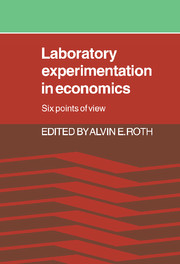Book contents
- Frontmatter
- Contents
- Acknowledgments
- List of contributors
- 1 Introduction and overview
- 2 Bargaining phenomena and bargaining theory
- 3 Equity and coalition bargaining in experimental three-person games
- 4 The psychology of choice and the assumptions of economics
- 5 Hypothetical valuations and preference reversals in the context of asset trading
- 6 Economics according to the rats (and pigeons too): what have we learned and what can we hope to learn?
- 7 Dimensions of parallelism: some policy applications of experimental methods
7 - Dimensions of parallelism: some policy applications of experimental methods
Published online by Cambridge University Press: 24 October 2009
- Frontmatter
- Contents
- Acknowledgments
- List of contributors
- 1 Introduction and overview
- 2 Bargaining phenomena and bargaining theory
- 3 Equity and coalition bargaining in experimental three-person games
- 4 The psychology of choice and the assumptions of economics
- 5 Hypothetical valuations and preference reversals in the context of asset trading
- 6 Economics according to the rats (and pigeons too): what have we learned and what can we hope to learn?
- 7 Dimensions of parallelism: some policy applications of experimental methods
Summary
Introduction
The term “parallelism” refers to a vague notion about how observations of simple laboratory phenomena can help one understand and predict the behavior of a complicated and changing world. Of what use are experimental results to someone who is interested in something vastly larger and more complicated, perhaps fundamentally different than anything that can be studied in a laboratory setting? Questions such as this and the related notion of parallelism have probably existed from the earliest development of scientific experimental methodology, and although I found the term in a paper by Vernon Smith (1980) the notion itself pervades all branches of science and engineering.
The purpose of this chapter is to isolate some examples of how the issue of parallelism has been approached in economics. The chapter outlines several strategies that have been employed in attempts to use experimental research in actual policy decision making. The topic to be explored is how issues have been posed in these policy-related studies so that experimental methods could be applied. The discussion is limited to 10 instances in which I have been involved personally at some level.
Many different opinions exist about experimental methodology and the relationship between laboratory work, field studies, and policy decisions.
- Type
- Chapter
- Information
- Laboratory Experimentation in EconomicsSix Points of View, pp. 193 - 219Publisher: Cambridge University PressPrint publication year: 1987
- 57
- Cited by



